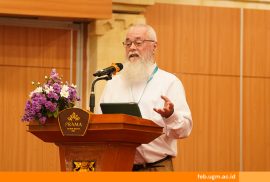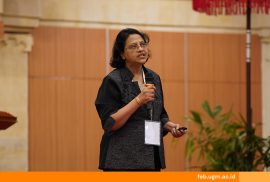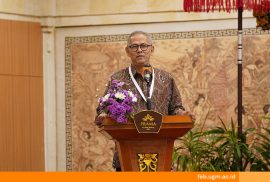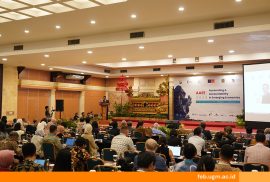The economic crisis which hit Turkey and Venezuela become a global concern, without exception to Indonesian government. This crisis was caused by a few policies taken by Donald Trump and The Fed, and caused emerging countries’ currencies to weaken, including the Rupiah as well. This weakening of the Rupiah may cause turmoil in the society.
Therefore, Wimboh Santoso, The Head of Commissioner Council of Financial Services Authority (OJK) visited Faculty of Economics and Business Universitas Gadjah Mada (FEB UGM) in order to give a general lecture with the theme “Current Economic Development and Exchange Rate Control” on Saturday (15/9). This general lecture, which took place in the Kertanegara Room, FEB UGM is part of OJK’s string of events, in sharing regarding current economic conditions and exchange rates to the society, especially scholars. This event is done with the purpose of avoiding societal panic regarding the exchange rate.
The general lecture was opened by a speech from the Dean of FEB UGM, Eko Suwardi, M.Sc., Ph.D. and was moderated by Dr. Bagus Santoso M.Soc.Sc. Wimboh Santoso explained that Indonesia has extraordinary natural resource richness. For example, the mining in Papua which is managed by Freeport. Unfortunately, this mining industry cannot be managed by ourselves due to political economy factor.
According to Wimboh, The United States has an innovation in technology and a dream to “rule the world”. Therefore, The United States conducts massive production in order to control the global market with their technology. To achieve those dreams, Trump enacts the protectionist system by imposing high import tariff. China and Turkey received the negative impacts of this protectionist policy.
There are three countries that face economic turmoil such as Turkey, Venezuela, and Argentina. The cause is normalization of Federal Reserve Fund Rate (FFR) by The Fed post global crisis in 2008 and exchange rate pressure.
From within the country, Indonesia has so long been entangled by energy subsidy policies. Energy subsidy that should be enjoyed by the poor, unfortunately, are enjoyed by the wealthy such as businessmen. Therefore, energy subsidies are diverted to infrastructure development such as toll roads, airports, and the LRT. These infrastructure developments are expected to integrate between one region to other regions within a location. For example, between tourist attraction sites with the hotel, or other attraction sites.
Wimboh added that Indonesia needs to encourage housing development. “When we build a house, we need cement, wood, steel, and iron. It also needs labor. Industry gets the demand. Society gets the income. Then, what should be considered is materials supply. Do not make a house when there are no materials. The price will go up.” added by Wimboh.
Beside infrastructure and housing, Indonesia needs to encourage export especially in the tourism sector. To encourage tourism, it needs an integrated infrastructure. “Tourist attraction must be integrated starting from tourism object, accommodation, transportation, handcraft, experienced gained by tourists, sanitation, and surrounding tourist attractions. Do not let tourist become disappointed because they only enjoy the attractions for 2 hours. Let’s compare with Disney Land, which has its tourism packages. Tourists will be asked how long do you want to travel? 3 days? 2 weeks? Or 3 weeks?.” said Wimboh.
Source: Ade/FEB




